-
Reasons to Upgrade Your Garage Door Opener This Summer
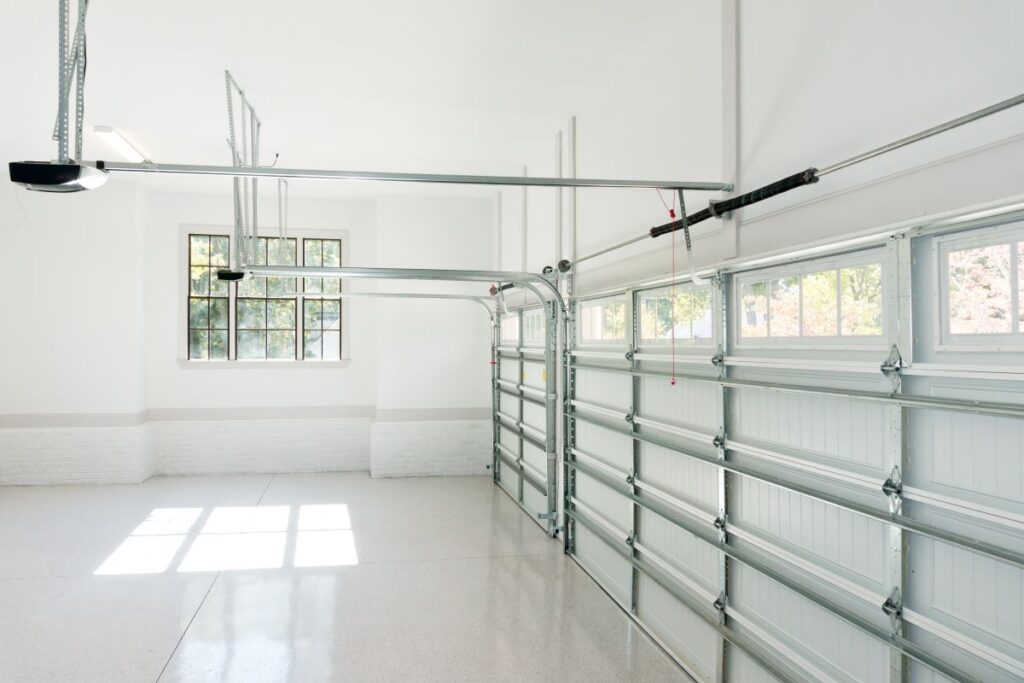
You’re arriving home after a long day and there’s a chilly torrential downpour. You use your electric garage door opener to attempt to park your vehicle and escape from the elements, but you quickly discover that it doesn’t work.
Until it stops working, most individuals give their garage door openers little thought. However, it’s more convenient to upgrade your garage door opener before it starts giving you significant trouble.
Here are a few reasons to upgrade your garage door opener this summer.
Your Current Garage Door Opener is Noisy
When you’re leaving for your early morning shift or arriving home after a late-night, you want to minimize any disturbance to your household or neighbors.
However, old electric garage door openers are prone to making a lot of noise; some even make a particularly annoying screeching sound.
Replacing your garage door opener with a more modern option will minimize any noise associated with opening and closing your garage door.
You’ll Have Better Control Over Your Garage Door
Updated garage door openers have innovative technology that makes it as easy as possible to open your garage door. New garage door openers have a better range and additional features that are a smart addition to your home.
Over time, garage door openers experience wear and tear. This makes them more likely to catch and refuse to open, causing you to have to manually open and close your garage door.
Or, the garage door may jam entirely and require an inconvenient emergency repair.
Newer Garage Door Accessories are More Efficient
New garage door openers use less energy than older models. Upgrading it helps you make your home more energy-efficient so that you can lower your utility bills and reduce your home’s environmental impact.
How to Upgrade Your Garage Door Accessories
Ready to learn more about garage door accessories that can enhance the functionality of your garage door? Contact Thomas V Giel. Garage Doors, Inc. at 724-443-1437 or contact us online.
-
5 Reasons Your Garage Door Won’t Close
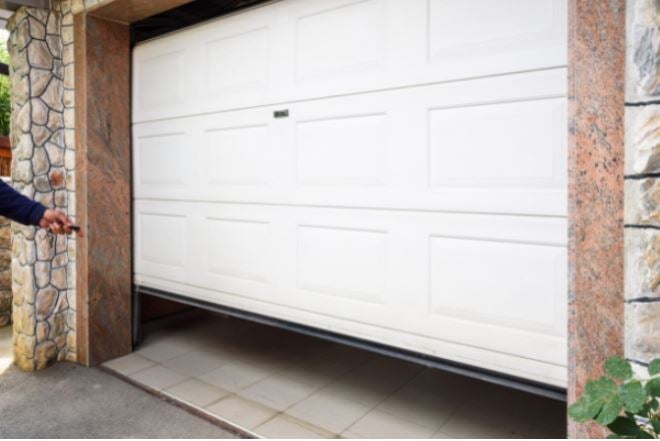
You leave your home and use your remote to close your garage door, only to see that your garage door refuses to close. While it’s frustrating when a broken garage door doesn’t work correctly, there are a few things that can impact its functionality. When you’re dealing with a major issue, it’s important to hire a garage door professional to fix the problem so that your garage door doesn’t incur additional damage.
Check out these five common reasons that your garage door won’t close:
- You Have an Issue with Your Garage Door’s Sensors
Your garage door’s sensors prevent your door from closing on a vehicle or other obstruction. If your garage door refuses to close all the way, you might have an issue with the sensors.
Try wiping the sensors with a soft cloth to remove dirt and dust that can keep them from functioning correctly. If you observe that a sensor is blinking, it might need to be realigned. This is done by loosening the sensor and adjusting it until the light no longer blinks.
- Your Tracks or Rollers Are Damaged
Damaged tracks and rollers are another frequent reason that a garage door won’t go past a certain point. If you spot components that are bent, a garage door repair professional can bend them back into place or replace them.
- Your Trolley Isn’t Activating
The component that attaches from your garage door to the opening mechanism is the trolley. If your garage door isn’t moving at all when you try to close it, the trolley may need to be reactivated.
- Your Door’s Limit Screw Needs To Be Adjusted
Your garage door’s limit screws are located on your garage door opener and tell it how far to open or close. If they’re too high up, adjust them downward with a screwdriver so that your garage door can fully close.
- Your Garage Door Remote Has a Problem
Sometimes, the issue is with your garage door remote, not your garage door. Replace the batteries in your remote and confirm that it’s connected to your garage door. If it still isn’t opening, you may need to call a local garage door company for repairs.
Request a Service Call for Your Garage Door
Contact Thomas V. Giel Garage Doors, Inc. online or by calling 724-443-1437 to schedule a service call for your garage door
-
How To Choose the Right Garage Door for Your Home
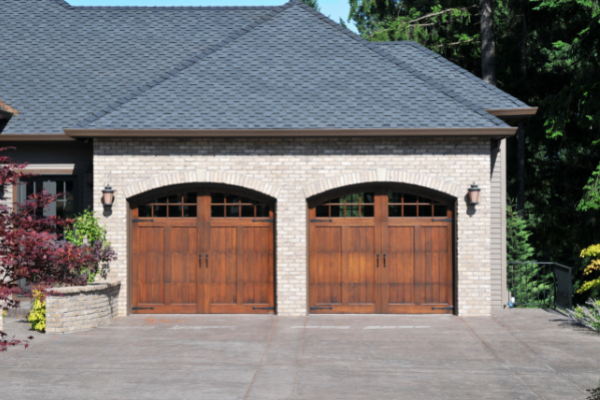
A garage door is an important functional item for your home’s exterior, providing you access to your garage while significantly impacting your home’s overall appearance. Here are a few things that will help you choose the right garage door.
The Material of the New Garage Door
The material for your new garage door affects its appearance, functionality, and durability. Some materials also require more upkeep to keep them looking their best.
A natural wood garage door is lovely, but it needs frequent refinishing. Composite is a more durable alternative that combines the appearance of wood with durability and longevity. Steel is a popular garage door material for many homeowners, thanks to its sleek look, multiple design options, and strong durability. Know that if you live on the coast, you’ll have to regularly wax your steel garage door to keep it from rusting.
The Garage Door’s Design and Style
Your garage’s door design and style should complement the architectural style and exterior details of your home.
For example, if your home has modern or Spanish-style architecture, a garage door with a barn door design will look out of place. However, if your home has a farmhouse or traditional architecture, a barn door-style garage door will complement its exterior appearance. Not sure which garage door will suit your home? Try out this tool to design and build your garage door.
The Specifications for Your Garage Door
You’ll want a garage door with specifications that can withstand your climate and weather conditions. If high winds are a frequent concern, you’ll need a garage door with a minimum level of wind resistance. Want to keep your garage at a more comfortable temperature and make your entire home more energy efficient? An insulated garage door will assist you with these goals.
Your Budget for Your New Garage Door
A gorgeous garage door with all the bells and whistles is of little use if it’s too expensive for your budget. Before you start shopping with a garage door company, decide how much you are wanting to spend and what features are most important to you.
Buy Your New Garage Door
Ready to explore potential garage door designs? Visit the Thomas V. Giel Garage Doors, Inc. website to get started!
-
The Importance of Proper Loading Dock Signage and Accessories
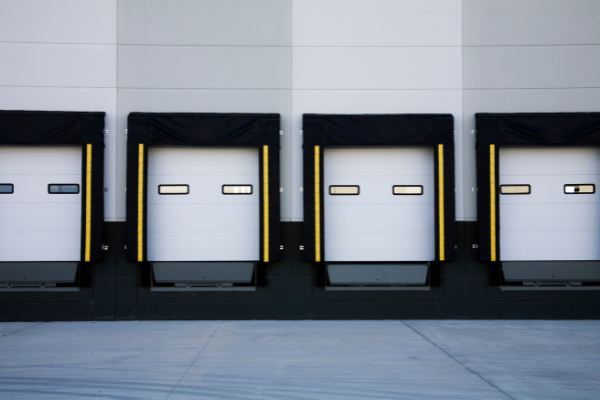
Loading docks are essential for keeping the nation’s freight networks running, but they also act as a potential source of illness and injury. Estimates indicate that thousands of accidents occur at loading docks each year; for every accident, there are many more “near misses” that could have easily led to an accident. Fortunately, adding proper loading dock signage and accessories is one of the most effective ways to make the dock a safer place to work.
How Loading Dock Signage and Accessories Make Loading Docks Safer
One reason that loading docks are so dangerous is that there are a lot of vehicles entering and exiting the space, making it likely that collisions or backovers occur. Signage that marks the flow of traffic can mitigate these risks. There should also be signage that specifies the speed limit and signs that define where loading and unloading areas begin and end. Traffic lights should be added to communicate to drivers when it’s safe to go or when a bay is open. They can also inform drivers when a bay is full or when the driver should stop.
Dock levelers and lifts should be available to assist with safely lowering freight. Loading dock doors should have dock seals and bumpers that prevent unwanted access to certain areas and keep precipitation outside so that it doesn’t create a slippery surface. Truck restraints are an invaluable accessory that keep trucks and other vehicles from leaving the dock during the loading or unloading process.
Tips for Ensuring the Effectiveness of Your Signage and Accessories
To ensure that your signage and accessories maximize your loading dock safety, it’s important to have any electrical or technical components installed by a qualified professional. A professional will utilize the proper installation procedures to make sure that the components work and function properly. You should also confirm that your accessories have sufficient weight limits for the trucks and equipment at your loading dock.
Improve Your Loading Dock Operations
Visit Thomas V. Giel Garage Doors, Inc. today to purchase the signage and accessories you need to encourage loading dock safety.
-
7 Benefits of Retractable Screens
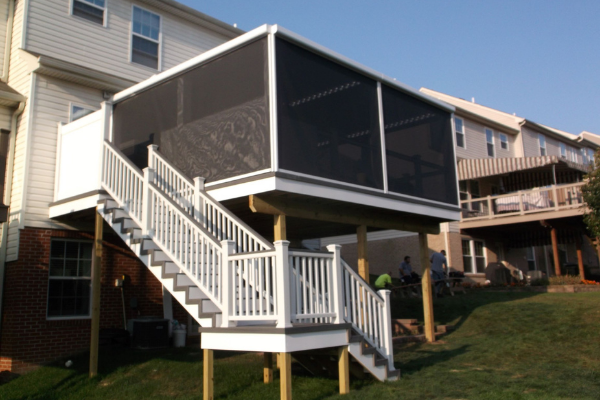
A screened porch can be a very comfortable and attractive living space. There are no rules dictating that porches have to be bare spaces with aluminum furniture. The addition of lights, outdoor carpeting, hot tubs, gas fireplaces, and even a TV set can turn your ordinary deck or patio into an oasis that your entire family will want to enjoy. The retractable screens that can create and define these spaces are cost-effective and attractive.
Retractable screens become an integral part of outdoor living by:
- Creating an outdoor living space – Retractable screens can essentially add another room onto your house and give you more space for relaxation and social gatherings.
- Protecting you from insects – Nothing can ruin your enjoyment of being outdoors more than having to shoo away mosquitoes, flies, and other uninvited pests.
- Adding value and curb appeal to your home – Everything you do to improve the amount of living space and the attractiveness of your home increases the value and makes it more appealing to potential buyers.
- Offering customizable options – Retractable screens are available in many different frame styles and colors and fabric or mesh options to perfectly match the style of your home.
- Being easy to use and maintain – There is no need to set up or take down your screen every time you want to use it. Simply extend it or retract it with the touch of a button. Your retractable screen will only need minimal if any cleaning.
- Shading and sheltering you from the elements – Retractable screens, shades, and awnings not only give you a place out of the sun, but they can noticeably reduce the need and costs for air conditioning during warmer months.
- Letting in light and fresh air – Retractable screen doors and retractable window screens can give you the ability to let the outdoors in and freshen your home without bugs and debris making their way inside your house.
Thomas V. Giel Garage Doors, Inc. is your source for many different styles and options of retractable screen doors and window screens. Contact us today to schedule a service call or to receive a free estimate.
-
6 Garage Door Accessories You Need
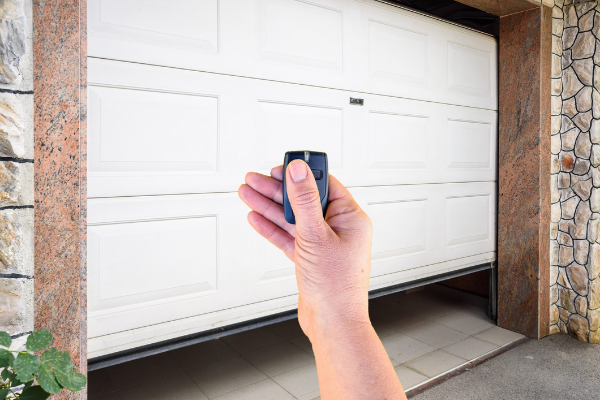
Just when we thought our garage door systems couldn’t get any safer, any more automated, or any more sophisticated, leave it to the technology companies to prove us wrong. As every industry advances, the same is true of garage door accessories. Wireless technology is improving our safety and control of our garage door systems in unbelievable ways.
Depending on the model of garage door opener your home has, these are some of the must-have accessories that will streamline your life as never before.
- Exterior wireless keypad – If you can’t find your controller, you can enter the four-digit code into the keypad to open the garage door from the outside instead of going inside the house.
- Garage door monitor – If you’ve ever gone to bed and wondered if you forgot to close the garage door, your worries are over. This monitor can tell you the door’s status and allow you to close it from any location inside your house.
- Laser parking system – This system provides a guide so that you park your car in the perfect spot every time.
- Internet gateway – Using a Wi-Fi connection, you will be able to open and close your door from any location in the world. This comes in handy if you aren’t home and you need to let a delivery person or a repair technician have access to your garage or home. You can also use it to be certain that the door is closed when it should be.
- Battery backup system – This will allow you to use your garage door opener even if there is a power outage.
- Mini remote control – This garage door opener is small enough to carry in a pocket or a purse so you can always keep it with you when you are away from home.
Thomas V. Giel Garage Doors, Inc., is your premiere garage door company for all the latest garage door opener accessories. We employ only licensed, experienced, and highly trained garage door technicians to install the accessories you need to make your life easier. Visit our website or contact us today to learn more or to schedule an appointment.
-
5 Reasons You Should Have a Louvered Pergola Installed This Spring
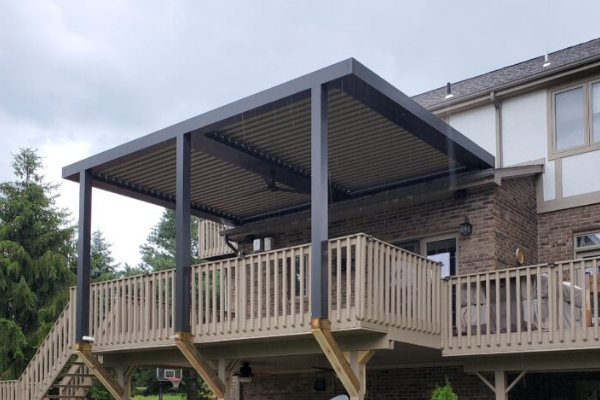
Dating all the way back to ancient Egypt and perhaps even earlier, pergolas have survived the test of time. They have been used to create shade for terraces and walkways, as the framework to grow vegetation, and as upscale hanging gardens for the affluent social classes. While they have evolved in form and function, pergolas are as beneficial for us today as they were centuries ago.
The use of a pergola is a way to improve a patio or other outdoor living space that is less than an enclosure but more than an open bare space. Pergolas usually consist of columns that support roofing style rafters or beams. They can be attached to a house or other structure or built as a freestanding structure. The amount of shade a louvered pergola provides can be controlled. The rafters can allow bits of sunshine to peek through or the shelter can be closed and shaded completely. The design styles are limitless and can be adapted to accommodate any style of home and climate. The definition of a pergola also extends to retractable shades or awnings that are popularly used to create backyard retreats and spaces for entertaining.
Spring is a great time to reimagine your outdoor living space and redesign it to meet your needs and goals. Here are just a few of the ways in which a pergola can improve your lifestyle.
- They increase your home’s value – A pergola raises the property value of your home by adding attractive living space.
- They are cost effective – The many design options and styles mean that it doesn’t have to break the bank to install a pergola.
- Pergolas create privacy – Even though the design of a pergola is inherently open, you can use your imagination to add dramatic curtains or screens to provide greater privacy in your backyard.
- They can offer the desired amount of shade – Whether you want some sunshine to nourish plants or complete shade for a cooler space to hang out, there is a design option that is just right for any purpose.
- Pergolas require little to no maintenance – The pillars, beams, and stationary or retractable shades are easy to rinse off and can provide many seasons of enjoyment.
Thomas V. Giel Garage Doors, Inc., has the expertise to help you choose the right pergola system for your home. Our insured and licensed technicians can perform the expert installation to create your perfect space. Contact us or visit our website today to learn more or to schedule a consultation.
-
How to Choose the Right Garage Door Company
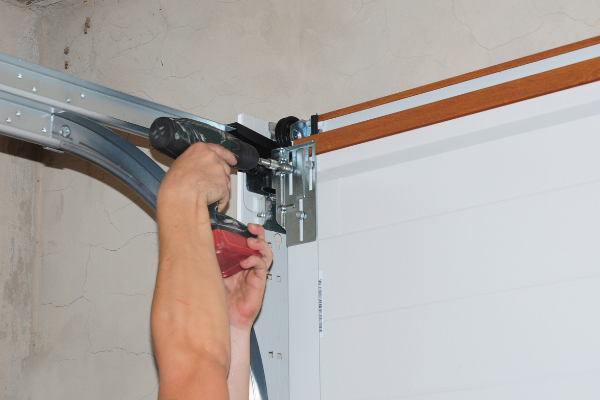
Garage door problems and failures naturally occur over time, but they should not happen right after you’ve had a new garage door installed. Your garage door should last anywhere from 20 to 30 years with proper care. Issues with the operation of your new garage door indicate that you have chosen the wrong garage door company.
Your garage door was not installed correctly if any of these issues are occuring:
- Damaged springs resulting from poor quality or negligent handling
- Noises like rattling or squeaking due to misalignment or damage done at the time of installation
- The door doesn’t open or close or these operations are delayed.
Like any other industry, garage door companies have been infiltrated by scammers. They are often transitory and downright suspicious when you know what to look for. These are good indications of a scam garage door company:
- The company is new, meaning that it has no history in the community or the surrounding area
- The name is generic and gives no indication of who the owners might be
- There is no physical or permanent address or reliable contact information
- The prices are ridiculously low
- The vehicles and work attire are not professional or do not display the name of the company, or worse, display the wrong company name,
- You can’t trace the history of the company through the BBB or other online sources
- There are no reviews or the reviews sound generic and are not from local residents,
- There is no website or if there is, it is vague and provides no assurance or credibility
- The advertising is excessive or even intrusive.
A reputable local garage door business will present itself entirely differently. The owners and employees will want you to be able to contact them and ask questions. They will provide transparency as to their business practices and examples of past work to assure customers that they are making the right choice.
When you have found the right garage door company, the answers to all of these questions should be yes:
- Do they carry insurance?
- Do they guarantee their work and offer warranties on products?
- Are their technicians experienced and have the proper qualifications?
- Do they have good online reviews and positive feedback from friends, neighbors, and previous customers?
- Do they provide estimates and disclose costs upfront?
- Are they professional, friendly, and honest?
Thomas V. Giel Garage Doors, Inc. can answer all these questions to prove that they are the right garage door company for all of your garage and entry door needs. Contact us or visit our website today to learn more or to schedule an appointment.
-
Benefits of Different Types of Entry Doors
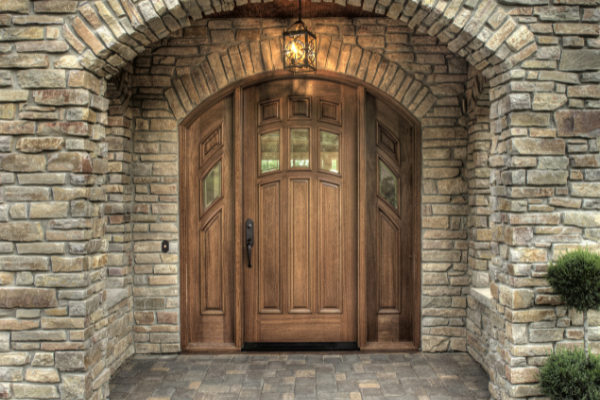
You only get one chance to make a first impression, and the same is true for your home. The entryway and front door can determine if the home looks inviting and friendly as opposed to cold and unnatural. Choices of materials and colors can perfectly complement your home’s style or they can completely distract onlookers from its more attractive elements.
Your entry door can be a very enticing focal point of your house without breaking the bank or being overly ornate. Since entry doors can be made from different materials and offer options like glass panels and sidelights, there’s always a choice that’s perfect for your style and budget.
Let’s take a look at the most common types of entry doors and what they have to offer.
Steel Doors
If you are especially concerned about safety, a steel door is an excellent choice because it will be harder to break into. In addition to increased security, steel doors also offer these benefits:
- Energy efficient core insulation
- Double and triple-paned glass units to let in light and to reduce heat transfer
- Resistance to warping, shrinking, and swelling
- Reduction of outside noise
- Customizable options
- Easy maintenance that only involves wiping or rinsing off dirt, an
- More affordable options
Fiberglass Doors
The strength and resilience of fiberglass doors mean that you don’t have to use a storm door to protect them. They offer these advantages:
- Easy installation
- Durability and strength against harsh weather and heavy use
- Energy efficiency
- Lightweight construction to reduce wear and tear on hinges and framing
- Simple maintenance
- Secure against break ins
- Versatility of styles and color options
Wood Doors
Wood is a naturally beautiful choice that also has the ability to remain unaffected by changes in temperature because it is a poor conductor of heat. Other benefits of wood doors include:
- Aesthetics – wood doors invoke a natural rustic feeling that is pleasing to the eye and the emotions
- Durability – solid wood doors hold up well over time
- Return on investment – a solid wood door can last a long time while retaining its beauty
- Resistant to outside noises
- Fire retardancy
- Styles include different types of woods and finishes
If you would like to explore your options or need door installation services, the professionals at Thomas V. Giel Garage Doors, Inc., can recommend a stylish and appropriate entry door for your house style and budget and perform expert and secure installation. Visit our website today for more information or to schedule an appointment.
-
Benefits of Aluminum Awnings for Your Home
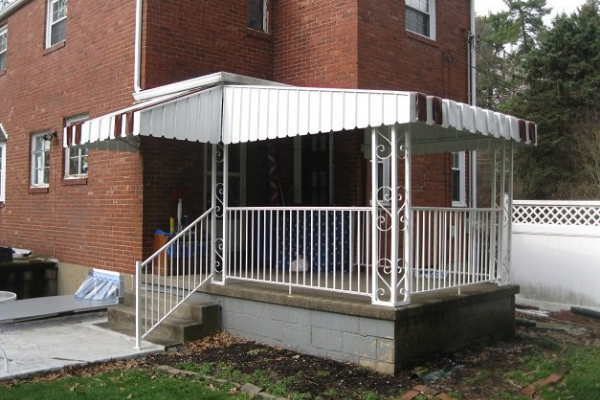
There are different types of awnings that have been used for hundreds of years. Fabric awnings date all the way back to ancient Egypt. Did you know that the first retractable awning was discovered during the time of the Roman Empire? Called a velarium, it sheltered the colosseum. In the United States, the first crude awnings began to appear over store windows in the mid-1800s.
While styles have changed, the purpose of awnings has not. They were always meant to shelter buildings, people, and goods for sale from the heat of the sun. Now, people can choose from fixed, retractable, motorized, and portable awnings. There are also choices of materials that include canvas, polyester, cotton, or metal.
The most common choices for metal fixed awnings are copper and aluminum. While copper is considerably more expensive, aluminum awnings present several reasons why they are a practical and sound choice to provide shade and protection for your home.
- They are more affordable than awnings made of copper or other metals.
- They can withstand high winds, rain, snow, and excessive heat without bowing, warping, or stretching.
- Aluminum awnings can last as long as 50 years with proper care.
- You can express your personality, because aluminum awnings can be crafted in a wide range of colors and styles including modern and traditional.
- They can save you money on your energy bills by sheltering your home from the heat of direct sun. The rooms inside a home that are protected by awnings are generally 20 percent cooler than other parts of the house.
- Aluminum awnings require very little care. All that is needed is the occasional brushing or rinsing off of dirt and debris to keep the awnings looking their best.
- They increase your outdoor living space by creating a protected patio and lounging areas.
If you would like to explore awning benefits and the addition of awnings to your home, the experienced professionals at Thomas V. Giel Garage Doors, Inc., can recommend the best styles for your home and provide expert installation. Contact us today for more information or to schedule an appointment.
